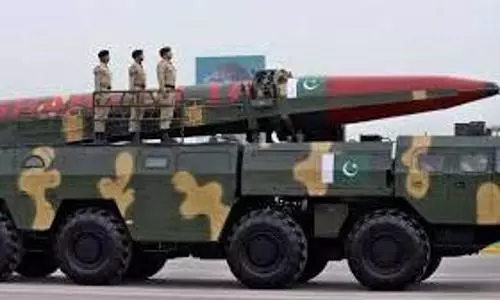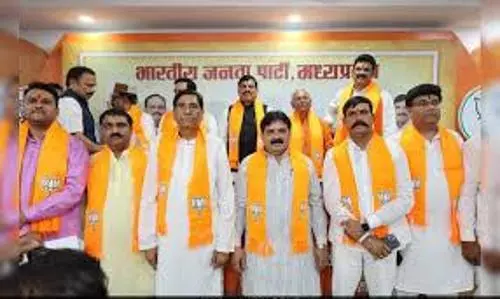
US diplomat acknowledges what Democrats call a quid pro quo
text_fieldsUS diplomat Gordon Sondland
"Washington: "I now do recall."
With that stunning reversal, US diplomat Gordon Sondland handed House impeachment investigators another key piece of corroborating testimony on Tuesday.
He acknowledged what Democrats contend was a clear quid pro quo, pushed by US President Donald Trump and his personal lawyer, Rudy Giuliani, with Ukraine.
Sondland, in an addendum to his sworn earlier testimony, said that military assistance to the East European ally was being withheld until Ukraine's new president agreed to release a statement about fighting corruption as Trump wanted.
Sondland said he was the one who carried the message to a Ukrainian official on the sidelines of a conference in Warsaw with Vice President Mike Pence.
"I said that resumption of US aid would likely not occur until Ukraine provided the public anti-corruption statement that we had been discussing for many weeks," Sondland recalled.
His three-page update, tucked beneath hundreds of pages of sworn testimony from Sondland and former Ukraine Special Envoy Kurt Volker, was released by House investigators as Democrats prepared to push the closed-door sessions to public hearings as soon as next week.
Late on Tuesday, Sondland flew to Portland, Oregon, and was met by a small group of protesters at Portland International Airport.
"I didn't change my testimony, but I can't answer any questions," Sondland told reporters. He didn't elaborate.
Trump has denied any quid pro quo, but Democrats say there is a singular narrative developing since the president's July 25 call with Ukrainian President Volodymyr Zelenskiy when he first asked for "a favour."
That request, which sparked the impeachment inquiry, included a public investigation into Ukrainian activities by Democratic former Vice President Joe Biden and his son and Trump's allegations of Ukrainian interference in the 2016 US election.
Pushing back, White House press secretary Stephanie Grisham issued a statement saying the transcripts "show there is even less evidence for this illegitimate impeachment sham than previously thought."
In the transcripts and accompanying cache of text messages, US diplomats are shown trying to navigate the demands of Trump and his personal lawyer, Giuliani, who they soon learn is running a back-channel US foreign policy on Ukraine.
"It kept getting more insidious," Sondland told investigators, as the "timeline went on."
Sondland testified that he spoke with Secretary of State Pompeo about Giuliani, "and Pompeo rolled his eyes and said: 'Yes, it's something we have to deal with.'"
In his revised testimony, Sondland, a wealthy businessman who donated USD 1 million to Trump's inauguration, says his memory was refreshed by the opening statements of two other inquiry witnesses, the top US diplomat in Ukraine, William Taylor, and Tim Morrison, a European expert at the National Security Council.
The ambassador initially testified on October 17 that he did not "recall taking part in any effort to encourage an investigation into the Bidens."
He told investigators he didn't know that the Ukraine firm Burisma, that Trump wanted Ukraine to investigate, was linked to Joe Biden's son Hunter.
But in the weeks since a May visit to Kyiv for Zelenskiy's inauguration, Sondland and the other diplomats had been heavily involved in Ukraine policy and in text messages about what Trump wanted as they came to realise the military assistance was being withheld.
Volker and Sondland both testified they were disappointed after briefing Trump at the White House about the new leader of the young democracy who was vowing to fight corruption.
At a pivotal May 23 meeting, Trump "went on and on and on about how Ukraine is a disaster and they're bad people," Sondland testified.
Trump holds an alternative view, pushed by Giuliani, that it was Ukraine, not Russia, that interfered in the 2016 elections in the US, a theory counter to US intelligence findings.
"'They tried to take me down.' He kept saying that over and over," Sondland recalled Trump saying.
Trump told the diplomats to work with Giuliani on Ukraine issues.
Over the time that followed, Volker and Sondland proposed to Zelenskiy's top aide, Andriy Yermak, that they a draft statement to be issued by Ukraine on potential interference with the US political process. At Giuliani's urging, that statement needed to have an "insert at end with 2 key items:" Burisma and the 2016 US elections.
"It was Mr. Giuliani who said: If it doesn't say Burisma and 2016, it's not credible, because what are they hiding?" Volker testified.
Pressed by investigators, Sondland testified that it would be improper for the US to prompt Ukraine to investigate the Biden family. "It doesn't sound good." The statement was never issued, as Ukraine refused it. Volker said he told Yermak it was "not a good idea."
Questions swirled after a government whistleblower's August complaint about Trump's phone call with Zelenskiy.
By September, Sondland also told investigators, Trump was in a "bad mood" and nearly hung up on him when the ambassador asked what it was he wanted from Ukraine.
"I want nothing. I want no quid pro quo," Trump said, according to Sondland. "I want Zelenskiy to do the right thing.























